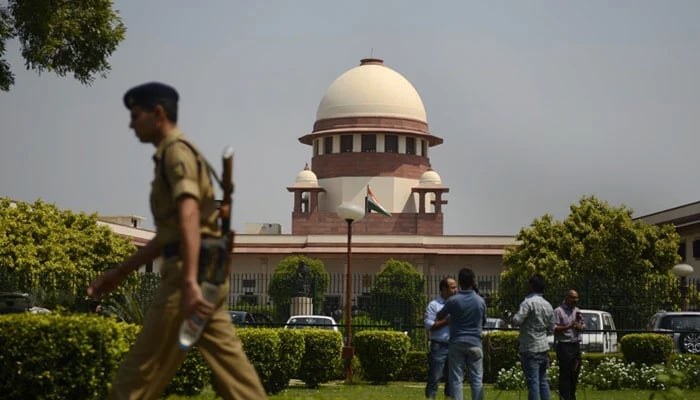Indefensible verdict
In a move that seems true to India’s tilt towards authoritarianism, the Indian Supreme Court (SC) on Monday upheld the Modi government’s decision to revoke the special status for the state of Indian Illegally Occupied Jammu and Kashmir (IIOJK).
The Modi government’s draconian step of revoking IIOJK’s special status on August 5, 2019 has now been rubber-stamped by the Indian top court. Experts say that this was an expected decision as the Indian top court is virtually a mouthpiece of the Modi junta.
By repealing Article 370 of the constitution, people from the rest of India were given the right to acquire property in the occupied territory and settle there permanently. Kashmiris see the move as an attempt to dilute the demographics of India’s only Muslim-majority region with Hindu settlers.
Pakistan’s Caretaker Foreign Minister Jalil Abbas Jilani has rejected the Indian top court’s verdict and said that New Delhi cannot abdicate its international obligations on the pretext of domestic legislation. Jilani believes that the final disposition of Jammu and Kashmir is to be made in accordance with the relevant United Nations Security Council (UNSC) resolutions and as per the aspirations of the Kashmiri people. Pakistan’s longstanding demand has been that the UN resolutions are the way forward, but we have seen that countless Indian governments have not heeded to this genuine demand. And when Modi was re-elected in 2019, one of the first things he did was the revocation of IIOJK’s special status. This was not unexpected and something that the government of Pakistan had been cautioning against for years, especially after Narendra Modi became the prime minister of India.
Unfortunately, the international community has turned a blind eye to the plight of Kashmiris because of their economic and geo-political interests related to India. International human rights organizations and Pakistan have been raising the issue of grave human rights violations in Kashmir and the arbitrary arrests of journalists, politicians, human rights defenders at every forum but to no avail. Since the revocation of IIOJK’s special status, the Modi junta has been trampling the rights of Kashmiris through a communication blockade, altering the demographic structure of the disputed territory, and other draconian methods. Many are now asking what Pakistan’s options are given that the Indian SC has also ruled in favour of the Modi junta. War is not an option. International diplomacy is an option that we have been engaging in for the last seven decades but due to Indian influence in the international market, we have not had much success. Pakistan has also tried resuming talks with India over the last few years but the Modi government always responds with its usual spiel of ‘terror-free environment’ when the fact is that there is no cross-border terrorism. Such shameless responses by the Modi government time and again point to the fact that they do not want to resolve the issue of Kashmir. From Pakistan’s perspective, it is imperative that India cancel its illegal annexation of Occupied Jammu and Kashmir; allow Kashmiris their right to self-determination; and withdraw its occupying forces. Equally important for India is to tone down its rhetoric against Pakistan at international forums. But the way that India has behaved over the years, especially since Modi came to power, shows that the Hindutva brigade is not ready for talks with Pakistan. Be it in Kashmir, Palestine or any other part of the world where an imperialistic power subjugates the local population, we must always stand not with those who have might on their side but those whose cause is just.
-
 Leonardo DiCaprio's Girlfriend Vittoria Ceretti Given 'greatest Honor Of Her Life'
Leonardo DiCaprio's Girlfriend Vittoria Ceretti Given 'greatest Honor Of Her Life' -
 Beatrice, Eugenie’s Reaction Comes Out After Epstein Files Expose Their Personal Lives Even More
Beatrice, Eugenie’s Reaction Comes Out After Epstein Files Expose Their Personal Lives Even More -
 Will Smith Couldn't Make This Dog Part Of His Family: Here's Why
Will Smith Couldn't Make This Dog Part Of His Family: Here's Why -
 Kylie Jenner In Full Nesting Mode With Timothee Chalamet: ‘Pregnancy No Surprise Now’
Kylie Jenner In Full Nesting Mode With Timothee Chalamet: ‘Pregnancy No Surprise Now’ -
 Laura Dern Reflects On Being Rejected Due To Something She Can't Help
Laura Dern Reflects On Being Rejected Due To Something She Can't Help -
 HBO Axed Naomi Watts's 'Game Of Thrones' Sequel For This Reason
HBO Axed Naomi Watts's 'Game Of Thrones' Sequel For This Reason -
 King Charles' Sandringham Estate Gets 'public Safety Message' After Andrew Move
King Charles' Sandringham Estate Gets 'public Safety Message' After Andrew Move -
 Lewis Capaldi Sends Taylor Swift Sweet Message After 'Opalite' Video Role
Lewis Capaldi Sends Taylor Swift Sweet Message After 'Opalite' Video Role -
 Brooklyn Beckham Plunges Victoria, David Beckham Into Marital Woes: ‘They’re Exhausted As It Seeps Into Marriage
Brooklyn Beckham Plunges Victoria, David Beckham Into Marital Woes: ‘They’re Exhausted As It Seeps Into Marriage -
 Sarah Ferguson Joins Andrew In ‘forcing’ Their Daughters Hand: ‘She Can Lose Everything’
Sarah Ferguson Joins Andrew In ‘forcing’ Their Daughters Hand: ‘She Can Lose Everything’ -
 'Bridgerton' Author Reveals If Actors Will Be Recast In Future Seasons
'Bridgerton' Author Reveals If Actors Will Be Recast In Future Seasons -
 50 Cent Super Bowl Ad Goes Viral
50 Cent Super Bowl Ad Goes Viral -
 'The Housemaid' Lifts Company's Profits: Here's How
'The Housemaid' Lifts Company's Profits: Here's How -
 Michael Douglas Recalls Director's Harsh Words Over 'Wall Street' Performance
Michael Douglas Recalls Director's Harsh Words Over 'Wall Street' Performance -
 Henry Czerny On Steve Martin Created Humor On 'Pink Panther' Set
Henry Czerny On Steve Martin Created Humor On 'Pink Panther' Set -
 Lady Victoria Hervey: Andrew Mountbatten-Windsor's Ex-girlfriend Proud Of Being On Epstein Files
Lady Victoria Hervey: Andrew Mountbatten-Windsor's Ex-girlfriend Proud Of Being On Epstein Files




